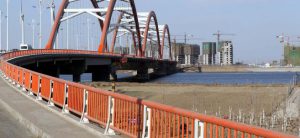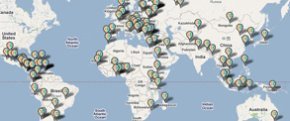China-Africa Partnership

China and Africa Partner for Opportunities in Time of Crisis
The Challenge
In a quickly evolving environment, new patterns are emerging in the areas of ICT and geographic fragmentation of trade, the direction of capital flows and production networks. All countries, developing and developed, are now facing critical choices and need to find ways to navigate a fast changing global economic environment and turn crises into opportunities.
The current global downturn poses several risks to Africa’s development, where GDP growth rate is estimated at 3.5 percent. Among these risks is the foreseeable slowdown of foreign investment flows, making the creation of new growth poles for local and national economies an important concern. The continent is now faced with the challenge of scaling up isolated successful projects and learning from others’ economic and investment policy experiences to accelerate its own economic and social progress. It is in this context that since December 2008, theWorld Bank Institute, in collaboration with the Africa and East Asia and Pacific regions has been organizing a series of South-South learning events on “Investment Climate and Balanced Growth” between Africa and China.
Drawing upon the examples of China’s economic growth, the workshops followed up on the successfulChina-Africa Experience Sharing Program on Development that took place in May 2008 and brought together 31 senior African officials to meet and exchange ideas with their Chinese counterparts. The objectives of the program were to share experiences, learn from China’s successes and failures, and explore ways to replicate these examples in the African context.
The South-South Learning Approach
Two workshops have been organized so far on “Cluster Development Experiences”. Using GDLN, the workshops linked 11 countries (in both Anglophone and Francophone Africa) with Beijing, China and Washington, DC. The sessions focused on ways to identify knowledge gaps and core aspects of a proposed China/East Asia-Africa Exchange Program on Special Economic Zones (SEZs), Foreign Direct Investment (FDI) and Cluster Development.
Participants included high level officials from key ministries (Economy, Finance, Industry, Planning, and Education) who manage Special Economic Zones (SEZs) and Export Processing Zones (EPZs), representatives from Chambers of Commerce, financial and development institutions, the private sector, and experts from academia.
Shanta Devarajan, the Chief Economist for the Bank’s Africa Region opened the second session by encouraging participating African countries to share their experiences and learn from each other through this public debate platform. “The key is to generate knowledge for change from within the country. It has to come from an exchange like this one: through learning what other countries have tried, what they have developed, what they have succeeded in and what they have failed in. It has to come from the people in the countries, those who know the country well, know its problems and know what ideas would work best,” he stressed, highlighting the Chinese successes and failures in development as an inspiration.
Structured as a two-way interaction between Chinese and African participants, the presentations during each workshop allowed for rich dialogue and knowledge sharing between countries, thereby showing the importance and relevance of the topic in Africa. The discussions also showed the dynamism of the clusters and important linkages with domestic growth, job creation and trade expansion, and the power of peer learning using modern technologies.
In addition, this South-South learning experience highlighted the challenges faced by many African countries and the critical role of government and public policies in promoting cluster development. For instance, participants in Senegal shared their experience in creating agriculture and tourism clusters to support the implementation of the “Accelerated Growth Strategy” in their country, an initiative with strong governmental backing.
Several questions were raised by the participants ranging from: what can be learned from past reform experiences in response to economic crises; how to scale up by using local resources to attract foreign investment; how to expand clusters and develop hubs in regions with low accountability; how to become competitive in the international market over time, especially with the current financial crisis; and what is the role of the government and international development agencies to help cluster developments in Africa.
On the issues dealing with regional integration and the creation of a conducive investment climate, Yang Wang, Program Leader for Investment Climate Capacity Enhancement Program at the World Bank Institute responded by saying “under the current economic downturn, regional integration has become even more important. Through trading with neighbors, developing production networks, building cluster across borders, there is great potential for African countries to achieve economies of scale, improve competitiveness, and maintain fast growth. Governments should concentrate on improving regulatory frameworks and creating a better investment climate”.
